‘Better Late Than Never’ Sends William Shatner, Henry Winkler, Terry Bradshaw, George Foreman on a Riotous Far East Road Trip
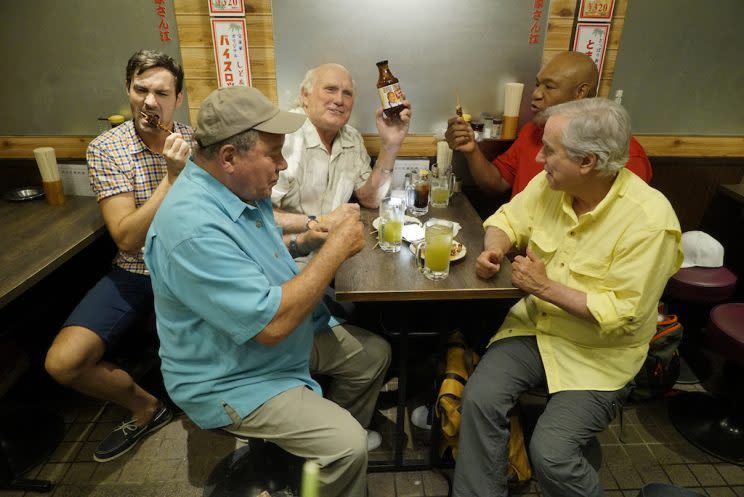
The Fonz, Capt. Kirk, a two-time heavyweight champion, an NFL Hall of Famer, and a standup comedian walk into a Japanese bar.
What sounds like the beginning of a bad joke is actually one of many heartwarming and hilarious scenes that make up NBC’s new reality series Better Late Than Never, a fish-out-of-water concept based on the South Korean hit Grandpas Over Flowers. It sends four famous elder statesmen (Henry Winkler, William Shatner, George Foreman, and Terry Bradshaw) to explore Asia for a month without personal assistants, publicists, limousines, presidential suites, translators, or any of the other creature comforts that their life in the limelight normally provides.
“You learn a lot about yourself when you travel and when you step outside your comfort zone,” Winkler, who also produced the series, told Yahoo TV after a Los Angeles press screening of the premiere episode a few weeks ago. “I never want to be too old to try new things. I also thought there was real potential for it to be funny.”
Shatner, who had never ventured anywhere more exotic than Australia, explained during the post-screening Q&A that he hopped aboard the BLTN train for the “challenge of going with four people you don’t know to a place you’ve never been.” He was especially sold when he heard who his fellow tourists would be.
“I thought, ‘If I could ever catch a pass from Terry Bradshaw’ … I watch football and analyze it all the time. I get groups of people coming up to my house for Monday Night Football, and we tear the game apart. And I thought, ‘If I could ever get in the ring with George,’ because I used to box a little. And Henry’s a very funny guy, [so] he could make me laugh. Wow, what a bucket list.”
And what about Jeff Dye (I Can Do That, Last Comic Standing), the relatively young buck who joined them on the journey? “We needed somebody young and strong to carry the luggage,” Shatner quipped dryly.
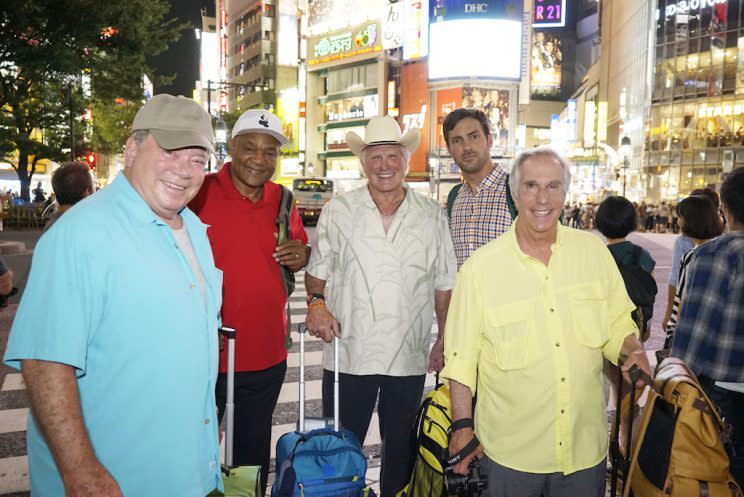
Dye told Yahoo later that afternoon, “And they needed someone who could use Google Maps and get us to the right bus and find an online translator. They would have been so lost without me. In all seriousness, I would have carried all their baggage for the whole trip if that’s what I needed to do to be invited to participate. I am fine being the butt of their jokes. These guys are just barely living legends.”
The quintet stops in Tokyo, Kyoto, Seoul, Hong Kong, Phuket, and Chiang Mai before heading home. Bangkok was on the planned itinerary, but the on-site production team rerouted them after a bombing occurred in that city. They appear on a Japanese game show, attend parades and ceremonies, visit historical and scenic sites, get tossed around the ring by a sumo wrestler, drink in robot bars, and eat porcine private parts (except Dye, who is a vegetarian). They also possibly almost jump-start an international incident at the demilitarized zone between the Koreas.
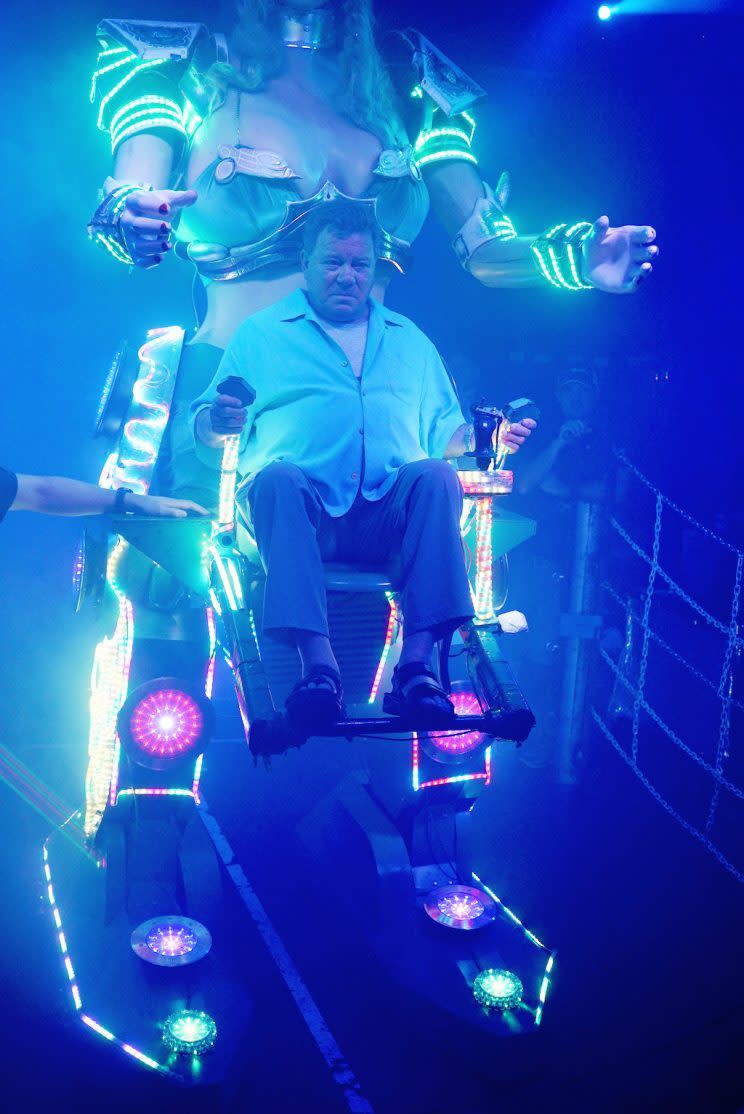
“We went because it’s very much a part of Korea. It was really interesting. We saw the tanks, and then [Jeff] thinks he has to take a picture,” Winkler teased at the press conference. “I cannot tell you what happens for fear of my life.”
Winkler would much rather talk in detail about the day he met an elephant in Chiang Mai. “This 15,000‑pound elephant looked me in the eye, and I looked the elephant in the eye, and I started crying. You felt the dearness. I have a picture on my phone, in my house, in everywhere. You see the elephant leaning into me like he was a puppy. This is not hyperbole. It came out of him like a river, this emotion. It was one of the great moments of my life, outside of my children, grandchildren, and family.”
Dye’s favorite city was Kyoto. “It is rich with tradition and felt like nothing I’ve ever known before,” he said. “When I travel, I want it to be different than anything I know. Tokyo is beautiful but just reminds me of New York.”
Shatner recalled interacting with locals as a highlight, even the ones who got away. “We had a water fight with colored water taken out of cesspools, and they were fired at us. During this fight, I had my mouth open, and this kid shot this long arc of water into my mouth. I’ll never forget that kid. That child’s face is emblazoned in my mind.”
Dye almost fell off his chair laughing at the retelling. “Your favorite encounter was a kid who wronged you?”
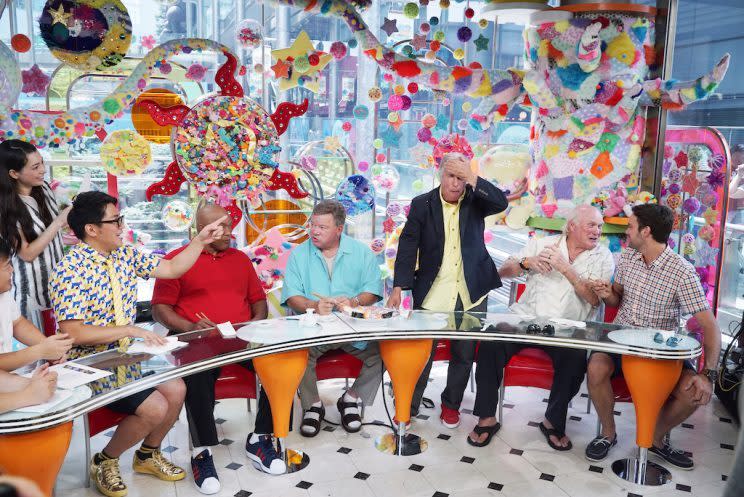
He and Winkler recounted tales of far friendlier people. “I was deeply touched by the children in each village,” said Winkler. “We met children everywhere we went, and there was no language between us. You could just have this wonderful circle together of nonverbal communication. George would sit down, and all of a sudden these children, who had no idea who this gigantic human being was and didn’t understand him, could have been his grandchildren. They found games to play, and punching, and sitting, and jumping. It was truly emotional.”
Cesspool squirter aside, Shatner actually felt hope despite the negative reinforcement delivered seemingly daily via the nightly news. “There were a lot of people friendly toward us Americans. And they didn’t know who we were because the shows — certainly the shows I’ve been in — weren’t playing in Asia.”
Both Dye and Shatner agreed that Winkler was the one most often recognized. Dye observed that public attention was occasionally a sensitive issue. “You have four people who are very successful in their fields, and while they respect each other’s success, I don’t think they are used to sharing status,” he told Yahoo at lunch. “They are used to being the center of their universe, and now they are traveling with three other famous people who are having people come up to them and ask for a photo or an autograph. It was almost like they kept a mental scoreboard. Sometimes it would cause flare-ups, and I think they will likely show that onscreen.”
Not everything was bon about their voyage. Dye lost/broke more than one phone. (At least one was claimed by the rocky road leading to a castle; another became part of the aforementioned international incident.) Most of them did not fit into the beds at the pod hotel. Shatner mentioned “lumpy mattresses and bad food.” And Winkler practically shuddered at the thought as he remembered the weather. “Honestly, the worst memory of the show was that from morning to night, it felt as if you were wrapped in plastic, head to toe. It was hotter than hot, wetter than wet all the time. You could see the air.”
Shatner admitted the lengthy journey presented some physical challenges. “Age does bring a certain number of ills, like sore knees and hips, and even endurance. The physical demands on all of us and dealing with [them were] a consideration. There’s something really opulent about going under the aegis of a studio who manages everything. You don’t have a worry in the world. All you have to worry about is getting to the train.”
And just like with every extended vacation you’ve ever been on with your friends or family, no matter how much you love them, eventually you need some alone time. Dye told Yahoo TV, “Most of the time, everything was great, but we spent a lot of time with each other, and sometimes you just get irritated and need space. It does not mean you don’t love your family. It was very hot, and some of the sleeping arrangements were terrible, and we would take trains or buses that were not comfortable, and we’d all turn into grumpy old men.”
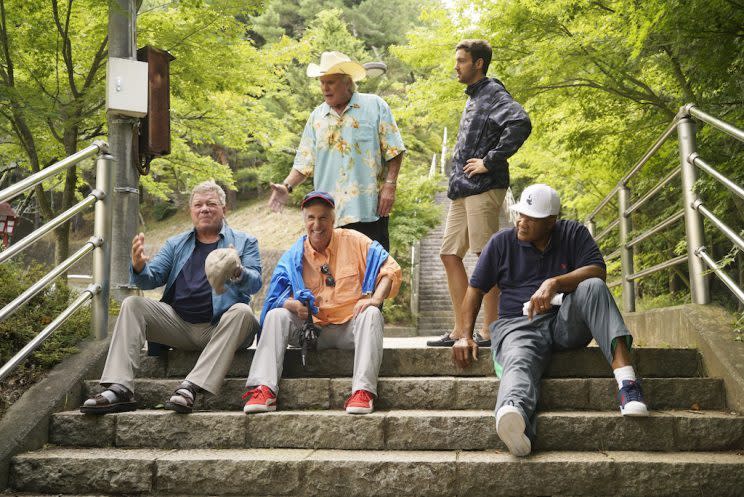
But at the end of the day, they never went to bed angry, and Dye said they grew from being strangers to good friends who helped each other face fears and climb mountains — sometimes literally — and had many deep conversations about life, work, aging, and even death. “I went in thinking of them as huge stars, and I left knowing they were also just four men, four husbands and dads that I can call friends,” Dye said. During the Q&A, he added, “I enjoyed just sitting back and watching them interact with each other and [listening to] the stories they would tell at dinners and those hangouts. I have the greatest stories that I’ll have for the rest of my life.”
Winkler added, “Our relationships start to change as we really get to know each other and [get] more comfortable with each other. I was able to go into the editing room and see what was going on. And each time I did, I thought to myself, ‘Wow, I want to be with those guys.’ And I’m in it. It was so delightful. I think that [viewers] will have an extraordinarily good time with us.”
“My only criticism of the whole project was that the cameramen would have to sleep at some point,” Dye said. “Because it’s a hilarious time 24 hours a day being around these guys, the people that come up to them, and just the things they share. They wake up early, and they argue about who was working out and who’s in the buffet. Terry and George were always up super-early battling on the treadmill.”
And Shatner promised that watching the series, if nothing else, “will take your mind off of Trump.”
Better Late Than Never premieres Aug. 23 at 10 p.m. on NBC.

